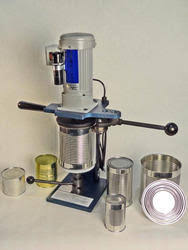In the realm of modern manufacturing, particularly in the food and beverage industry, the reliability and consistency of packaging machinery are crucial factors that directly impact production efficiency and product quality. This is especially true for can packaging machines, which play a pivotal role in ensuring that goods are securely and efficiently packaged for distribution and consumer consumption.
Precision Engineering and Design
Can packaging machines are engineered with precision and meticulous attention to detail. They are designed to handle a variety of can sizes and shapes while maintaining high-speed operation to meet the demands of large-scale production environments. The design process involves integrating advanced technologies such as servo-driven mechanisms, automated control systems, and precise sensors to achieve optimal performance and get more details at www.levapack.com.

Key Components and Mechanisms
Several key components and mechanisms contribute to the reliable operation of can packaging machines:
Feeding Systems – These systems ensure a continuous and uniform supply of cans into the packaging line. They often employ conveyors, rotary tables, or vibratory feeders to maintain a steady flow of cans.
Filling Units – Can filling units are equipped with precise volumetric or gravimetric filling mechanisms to accurately dispense liquid or solid contents into each can. This ensures consistency in product volume and weight, adhering to stringent quality standards.
Sealing and Capping – Sealing and capping mechanisms are critical for maintaining product freshness and integrity. Machines use various sealing techniques such as heat sealing, vacuum sealing, or lid placement followed by crimping to securely seal cans.
Labeling and Coding – After sealing, cans are often labeled and coded with batch numbers, expiry dates, and other essential information. Automated labeling systems apply labels accurately, while coding systems ensure clear and legible markings for traceability.
Quality Control Systems – Integrated quality control systems employ sensors and cameras to inspect filled cans for defects such as underfilled or improperly sealed cans. Any deviations from quality standards trigger automatic rejection or corrective actions to maintain product consistency.
Operational Efficiency and Flexibility
Can packaging machines are designed for high operational efficiency and flexibility. Modern machines can handle a wide range of can sizes and packaging formats with quick changeover capabilities. This flexibility allows manufacturers to adapt swiftly to changing market demands and production requirements without prolonged downtime.
Maintenance and Reliability
To ensure continuous operation and minimize downtime, can packaging machines require regular maintenance and servicing. Scheduled maintenance activities include lubrication of moving parts, inspection of wear components, and calibration of sensors and actuators. Manufacturers often provide comprehensive maintenance schedules and support services to optimize machine performance and longevity.
Regulatory Compliance and Safety
Adherence to regulatory standards and safety protocols is paramount in the design and operation of can packaging machines. Manufacturers ensure that machines comply with local and international regulations governing food safety, hygiene, and operational safety. Safety features such as emergency stop mechanisms, guarding, and interlocking systems are integrated to protect operators and maintain workplace safety.
The reliability and consistency of the types of sealing machine are fundamental to achieving efficient and high-quality production in the food and beverage industry. Precision engineering, advanced technologies, stringent quality control, and adherence to safety standards collectively ensure that these machines perform optimally, meeting the evolving needs of manufacturers and consumers alike.
